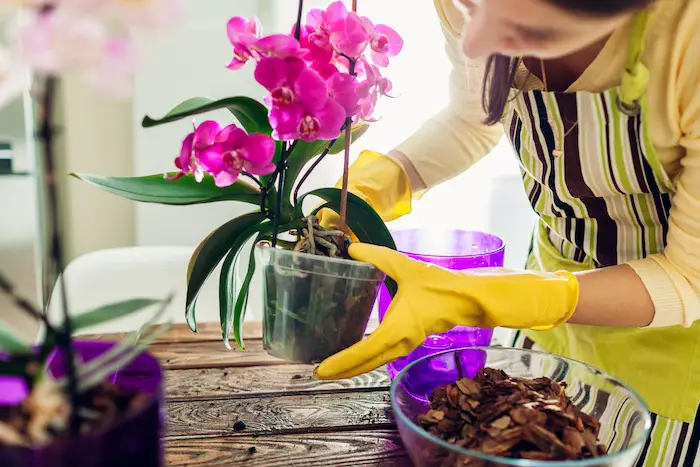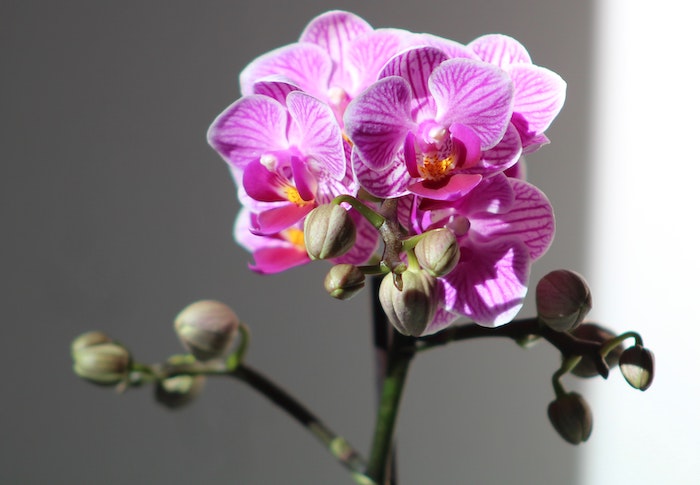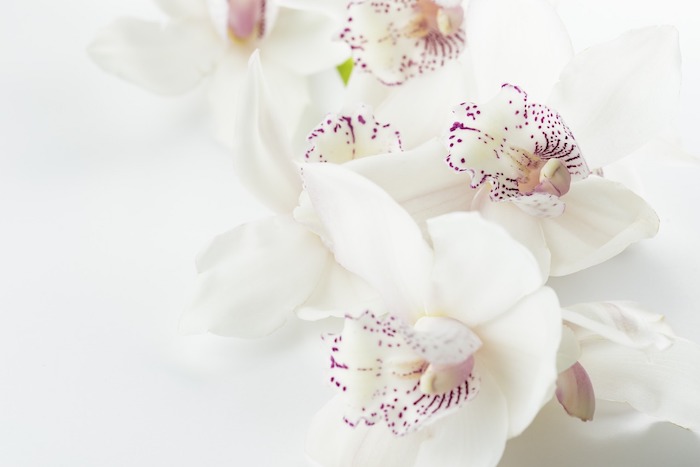Orchids are beautiful flowers whose sight every plant enthusiast would love to behold. Despite most of them having no smell, most people find them beautiful and admirable. In fact, if you grow it at home, it becomes an important element of your décor. If you just received an orchid as a gift and you would like to grow some in your home, you may be interested to know how long they will live.
So, how long do orchids live in a pot? Ideally, orchids can live in a pot for years or even decades if well taken care of. There have been cases where orchids have lived for 20 years and others even up to or more than 100 years. However, the average standard lifetime would be 20-22 years depending on the care given.
In this article, we will talk more about orchids, how they are planted, their lifespan in different conditions, maintenance tips, and other related questions. Keep reading to learn more.
The Growth of Orchids
Orchids are exotic flowers with over 20,000 types grown all around the world. The growth of orchids is conditioned with certain factors including, proper potting, lighting, and temperature and soil base.
- Proper Potting
You are definitely going to plant your orchids in a pot. This is not just any pot, but one that meets the needed conditions. First, it should have plenty of drainage holes at the base to drain off all excess water. If you order an orchid and it comes in a pot with insufficient drainage holes, you have to transfer it to one that does.
- Temperature
The ideal temperature for orchid growth is between 16 and 24 degrees Celsius. When you combine this moderate temperature with sufficient air circulation, your orchid will produce big and beautiful flowers.
- Soil Base
Orchids do well in fast-draining soil, preferably bark or moss-based potting mix. The kind of care you will give your orchid will vary slightly depending on which of the two soils you choose. In the bark-based mix, the water drains faster, and you have to water the plant frequently. The moss mix tends to retain more water, reducing the frequency of watering intervals.
- Lighting
Orchids need a lot of light but not direct light. Put your pot in a strategic position such that they receive sufficient light. If the light is too strong, you may need to filter it using a sheer.
Watering Your Orchids

The frequency of watering orchids may vary depending on the potting medium, humidity levels and climate. You can water them every few day, but avoid overwatering. Overwatering will lead to root rot, a disease commonly found in orchids.
How do you determine the right time so that you do not overwater your orchids. Knowing the right time to water your orchids is simple. Simply push your fingers into the soil in your orchid pot.
If you feel some moisture, there is no need to add any more water. However, if it is dry with no moisture, then you can add some water to soak it. Alternatively, if you are using a clear pot, you can check for condensation. If there is any condensation, you do not have to add any more water.
The Life Cycle of an Orchid
The life cycle of an orchid is similar as that of other flowers. The orchid seed results from crossing two parent pants.
Plant enthusiasts vary the orchid colors to create beautiful plants. The seed may take up to two years to germinate into a unique plant, but the long wait is worth it given the results.
The plant will take around three months for the flowers to blossom. For the flowers to blossom, the plant needs a lot of energy, which it takes from the leaves. During this time, the leaves will even turn yellow and fall off, and you might despair thinking your plant is dying; however, this is just part of the cycle.
Once it blossoms, it will then start growing its roots. The roots are essential for gaining nutrients needed for the growth of more flowers and overall growth of the plant. The flower will bloom for several months, and during this period, it can undergo pollination again.
The whole life cycle may take roughly 9 to 14 months and it can bloom again as long as the orchid does not die.
How Do You Care For Your Orchids Once They Have Bloomed
After your orchid has bloomed, you must continue maintaining it well to keep it healthy. You will continue watering, feeding, and pruning it. If possible, you can even transfer it to another pot with new moss or bark soil to give it a fresh start altogether as you practice the care tips outlined below.
- Adding fertilizer– fertilizer is essential when it comes to re-blooming orchids. Use the balanced houseplant fertilizer either once per week or per month dependent on the variety.
- Pruning-once the flower dries, prune the stem. You can do this by removing the dried flower spike just near the stem base. Usually, an orchid does not bloom twice on the same stem, which is why pruning is necessary.
If you take proper care of your orchid while practicing the tips above, within 6 to 9 months your plant should be blooming again. Failure to bloom as expected would be because of one or more of the reasons listed below:
- Too little or too much water
- Too much or insufficient light
- Wrong temperature
- Too much/little fertilizer used
- Failure to repot
- Not the right season
The Lifespan of Orchids under Different Circumstances
We have already seen that orchids can live for a long time given proper care. Below, let’s look at how long an orchid lives given different circumstances.
1. Orchid inside the house
Orchids inside the house are mainly for their aesthetic value. If you take good care of your house orchid by watering it once a week, pruning, feeding it with the right fertilizer, it could live for many years as we have discussed above.
Additionally, keep them under cool temperatures, preferably 50-60 degrees Fahrenheit. Avoid overwatering too.
2. A cut orchid
Most types of orchids are preferred for events such as weddings because they last longer than other types of flowers. However, you must take extra precautions when cutting and packaging the flowers. Once you receive the cut orchids, you must store them under certain conditions to extend their lifespan.
3. A cut orchid in a decorative vase
Once your orchid has bloomed, you can cut it and place it in a decorative vase. All you have to do is cut it together with the stem, dip in warm water for about 15 minutes, remove it, cut ¼ inch off the base of the stem, and place the flower in your vase. The vase should have warm water (37 degree). This trick will keep you cut orchid flowers for longer and you can continue enjoying the beauty.
Growing Orchids Indoors Vs. Outdoors
Orchids are mostly kept indoors as ornamental houseplants. They are easy to grow and maintain when kept indoors. However, they can also grow outdoors like under the shade of a tree.
The indoor ones will continue growing as long as you water them well. The outdoor ones will also grow, but they will always be under constant attack from insects and other external factors such as harsh weather conditions.
Thus, an orchid grown indoors is more likely to live longer compared to the one grown outdoors.
Related Questions
How long will the orchid bloom last?
Apart from knowing the lifespan of the orchid plant, many people also love to know how long the orchid bloom will last. The plant will blossom once a year and these colorful blossoms can last for weeks or even months. In fact, some select hybrids undergo repeated bloom cycles while some even flower continuously.
Are orchids perennials or annuals?
Orchids once planted, they keep blossoming and growing yearly, meaning they are perennials. All you have to do is water it properly, prune it, give it sufficient light, and keep it under the right temperature, and it will keep blooming when it is time.
Can you increase the lifespan of an orchid?
Yes, you can increase the lifespan of your orchids by taking good care of them. Similarly, you can also shorten their lifespan if you are not caring for them properly. To make them live longer in the pot, always water them as needed and prune them as necessary. Also, remember to add houseplant balanced fertilizer.
See Also:
Why Are My Orchids Flowers Falling Off
Ultimate List Of Fragrant Orchids


